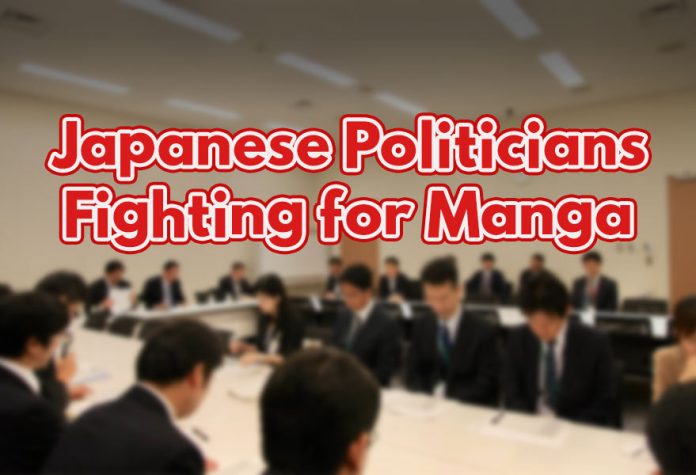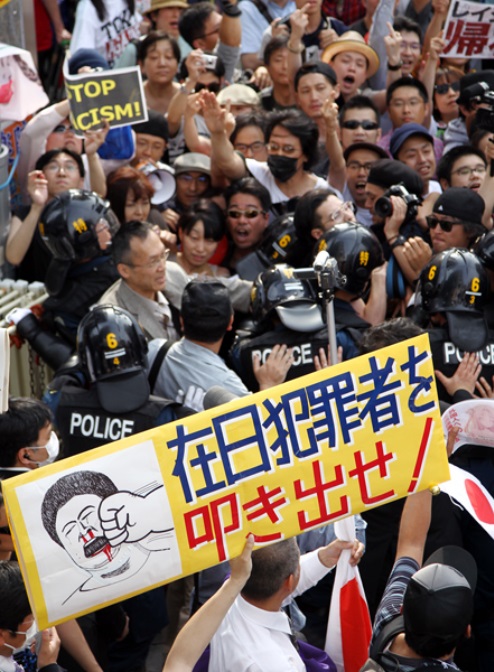
Ken Akamatsu being elected brings political representation for the manga industry. So what is the MANGA Giren and what do they fight for?
Disclaimer: This is an “Editorial” article. This article contains the writer’s personal opinion. The opinion of the writer does not reflect the opinion of Irodori Comics.
Ken Akamatsu gives a political voice for the manga industry
Ken Akamatsu, the manga creator of notable works such as Love Hina and Negima, won a seat in a House of Councillors as a candidate representing the long-running conservative Liberal Democratic Party (LDP) on July 10, 2022. He will be the first manga creator to become a legislative politician.
With Akamatsu’s victory, there is one more prominent politician whose agenda is to protect the freedom of speech in the manga, anime, and gaming industries. Who are the other candidates, though?
What is MANGA Giren?

Despite its name, MANGA議連 (MANGA Giren) is not just about manga. Its formal name is マンガ・アニメ・ゲームに関する議員連盟, which translates to “Non-Partisan Parliamentary Group relating to Manga, Animation, and Game.” MANGA stands for “Manga, ANimation, and GAme.”
What do they do?
This parliamentary group consisting of members from various political parties aims to take political action to support the three industries through the creation of archive facilities, improvement of labor conditions for workers in said industries, tackling piracy, fighting against censorship, and more.
One of the establishing members of MANGA Giren is Taro Yamada, an LDP politician who has long fought for the freedom of expression in manga. Yamada came to support Akamatsu during his election campaign, and furthermore, the two of them created the anti-censorship group, 表現の自由を守る会 (Hyougen no Jiyuu wo Mamoru Kai) which can be interpreted as the Freedom of Expression Protection Association.
While Akamatsu is not listed as a member of MANGA Giren since he won the election as of this writing, Akamatsu was at the inaugural meeting of MANGA Giren in 2014 and has been an advisor to the group since then. It is likely that he will formally join the group in the near future.
Who are the politicians in MANGA Giren?
At the moment, MANGA Giren has 19 members. Of the 19 members, ten are from the LDP (including chief advisor Taro Aso and chairman Keiji Furuya), three from Komeito (a party that has joined the coalition with the ruling LDP), four from the Constitutional Democratic Party of Japan (main opposition party of the LDP), and one from the Japan Innovation Party (another conservative party in Japan).
Is MANGA Giren really fighting for the freedom of expression?
…警戒を憶える。
それを明確に意識したのは2019年京アニ事件。マンガ議連会長の古屋圭司衆院議員が、犠牲者の実名公表を控えるように、政府、警察庁を通じ、京都府警に圧力をかけたことが、当時、京都新聞によって報じられた。
画像は2019年8月30日の京都新聞から#元JAniCA理事から見た赤松健 pic.twitter.com/Mc12SwXgf8— 森田宏幸 (@Morita626) July 7, 2022
Hiroyuki Morita, an animator and the former director of the Japanese Animation Creators Association, noted that he felt alerted about MANGA Giren’s political action when he read an article in Kyoto Shimbun Newspaper about the 2019 Kyoto Animation arson attack.

This article (which is no longer available online at this time of writing) detailed that the chairman of MANGA Giren pressured and silenced the Kyoto Prefectural Police into not releasing the names of the victims through the powers of the national government and Tokyo Metropolitan Police.
Fighting for freedom of expression means supporting all forms of speech. Press Freedom falls under that umbrella. It’s contradictory for a chairman of a parliamentary group that is loudly speaking for the protection of “freedom of expression” to silence the very thing they are supposedly fighting for.
Will the LDP really support the MANGA Giren?
Not only that, but historically, the LDP has been the one party that has always tried to censor manga content. Even Akamatsu said so himself in an interview. In the same interview, Akamatsu noted that one of the reasons why he decided to run as an LDP candidate was that non-LDP parties that he has worked with previously started to “go overboard with gender equality”.
Given LDP’s historical inclination toward censorship in all means of media, politicians like Ken Akamatsu and Taro Yamada who are “fighting for the freedom of expression in manga” are a minority within the LDP.
Just imagine if a politician was running as a US Republican Party candidate on a pro-abortion or pro-gun-control platform. Hypothetically, a candidate can try to “change the party from the inside”, but considering the strong anti-abortion and anti-gun-control cultures within the Republican Party, this candidate will likely be unsuccessful in changing the whole party. In fact, this candidate might be crushed from within.
Ken Akamatsu and Taro Yamada may have high hopes about their narrowly defined “freedom of expression” that pertains only to manga, anime, and games. But for them to accomplish anything substantial in regards to their agenda, they will first need to overcome large roadblocks from within their own party.
On’s Take
The momentum and support behind both Akamatsu and Yamada will be something to keep an eye on. Japanese culture is a culture based on seniority. “Fresh faces” like Akamatsu and Yamada are often “bench warmers” for their first two terms, and usually have very little to no influence within the party. With credit card companies and various lobby groups cracking down on and censoring Japanaese content, action needs to be taken now, and not 3 years in the future.
One thing they do have to be careful of is how they frame their “freedom of expression“. Currently, Akamatsu uses the English term “Poltical Correctness” (ポリコレ) in some of his materials. Being “anti-political correctness” is a form of freedom of expression, but is not a freedom of consequence.
If his supporters start to mix up “being able to say what they want” with “it’s okay to say hateful things against minorities and LGBT folks”, that will backfire on Yamada and Akamatsu, even if they didn’t encourage it. The press will blame those two as the people who enabled it.
A balancing act many politicians have failed
When far-right Japanese nationalists were protesting the streets of Shin-Okubo (a district in Tokyo with a large Korean community) and chanting hateful slurs and wielding “Go back to Korea” banners, the late Shinzo Abe defended the nationalists and their “freedom of expression”. Technically, he was right in that those demonstrators do have a right to say those hateful things. However, Abe was crucified by the press and the court of public opinion. Many believed that he “encouraged being racist” and “gave a green light” for hate crimes.

Ex-US President, Donald Trump, to this day, is remembered for his “very fine people on both sides” comment about violent protests at Charlottesville.
Right now, Yamada and Akamatsu are media-darlings for many otaku-related media. Even foreign sites like ANN and so on cover Akamatsu’s political campaign in detail. But if they are not careful, and their fight for freedom of expression is co-opted as a “license to be hateful” by bad actors, they might very well see the media turn on them.
Other:
- The first obstacle for Akamatsu and Yamada will be Japan’s new Justice Minister. He’s an ex-cop who hates porn.
- Japanese adult platform FANZA (DMM) bans MasterCard to fight against their censorship rules.
Source: itmedia, TOKYO SPORTS, Bunshun Online
Whatever your stance is on politicians being involved in manga, we can all agree that buying doujinshi for 99 cents is a great deal!

If you enjoyed this article, you can support us by buying our officially localized English Doujinshi on our Irodori Comics Store! Works are uncensored and DRM-Free for you to keep!
Furthermore, when you buy works on our website, up to 60% of the selling price goes directly to the artists as royalties! Since the Japanese Yen is at historical lows, USD royalties go a long way for our artists.
Read more news articles here.













